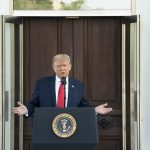As the summer days fade and leaves begin to turn, Americans find themselves in a veritable political battleground. This Labor Day, the stakes could not be higher as candidates vie for the coveted votes in key swing states. With 93 electoral votes hanging in the balance, it’s clear the economy is front and center in voters’ minds, overshadowing many other pressing issues. In a time where wallets seem to be lighter, the question remains: which economic message will resonate most with the electorate?
The national discourse is dominated by Vice President Kamala Harris’s recent comments, wherein she insisted that her core values have remained constant, even as her policy positions seem to shift like sand underfoot. This assertion has raised eyebrows and sparked skepticism among both supporters and critics alike. In a world where voters crave authenticity, Harris’s insistence that her values are unchanged amid a changing political landscape raises an intriguing question: can one truly hold steadfast beliefs while adjusting policies to fit the changing political winds?
Particularly in the context of contentious issues like fracking and immigration, Harris’s statements appear contradictory. For instance, her previously stated opposition to fracking stands in stark contrast to a softer stance she has been attempting to now adopt. This inconsistency makes one wonder how her values can truly remain the same if the policies she advocates diverge significantly from her past platform. To many, such contradictions underscore a potential lack of sincerity, leading to further mistrust as the elections draw near.
As the chatter around “Bidenomics” intensifies, so too does voter frustration. Polls suggest that a staggering 70% of Americans rate the economy as poor to bad, attributing their frustrations to the policies of the current administration. Many voters are left reminiscing about the economic landscape under former President Donald Trump, characterized by low unemployment and relatively stable prices. The stark contrast between then and now is notable: inflation has soared, and prices of everyday goods continue to climb, prompting Americans to pause and reflect on their economic well-being.
The political ramifications of the current economic climate are substantial. The electorate is increasingly holding the Biden administration accountable for the inflationary pressures they are experiencing, which, according to many analysts, stem from excessive federal spending and hasty recovery measures post-pandemic. As voters take stock of their financial situations against the backdrop of rising rents and higher prices, they may find themselves looking to alternative visions for America’s future—the campaign strategies for Trump and other Republican candidates are likely to focus on these failures as they seek to sway undecided voters.
As we edge closer to the election, the debates will only heat up, testing whether candidates can adeptly navigate the stormy waters of shifting voter sentiments. Will Kamala Harris manage to convince the public that her values are what they are looking for? Or will voters turn back to the tried-and-true policies of the past, as they weigh their choices in this political arena? One thing is for sure: Americans are paying close attention, and it’s going to be an intriguing lead-up to the polls.




